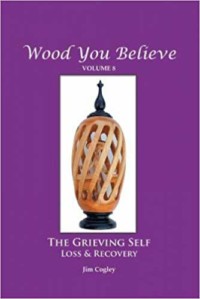Wood You Believe: The Grieving Self. Loss & Recovery
Author: Fr. Jim Cogley
Publisher: Matchstick
ISBN: 978-1642544046
Pages: 140
Genre: Non-Fiction
Reviewed by: Aaron Washington
Pacific Book Review
“Our lives are defined not by what happens to us, but rather by what we do with what happens to us.” I so much loved that first sentence of the introduction part as it made me think about my life and the bad things that have happened in my past. How we move on from a tragedy or grief is what defines us, not the pain we went through. I have to say that this book is essential in our everyday living. As an adult, you have gone through at least one period in your life where things were rough and agonizing. Be it the loss of a business, death of a loved one, loss of a part of yourself, trauma, or loss of your financial status. Such times are the most difficult in our living.
We all would want to live a smooth life with no bumps, but that’s not how things happen. So, how do you deal with grief? Is it okay to give up hope at some point? The author deeply talks about all this, and ways of coping. Fr. Jim Cogley listed the common types of grief, how they affect us and how we can try to deal with them. When talking about grief, we often focus on death only. There are a lot of personal losses which make us grieve.
Disappointments, failures, despair and unachievable goals can cause grief too. Grief is destructive. It makes us negative, pessimistic and envious. It kills the energy in us and destroys our health. Grief is painful and makes us needy and puts us into a victim mode. Reading about all this made me understand why different people grieve differently.
Death is the most common cause of grief. In one of the pages, the author writes about a woman who had gone to see a doctor as she did not know how to live after the death of her husband. The prescription the doctor gave her was rather perplexing. The doctor wrote “more tears” on a writing pad and gave her the slip. This was not what she had expected. Asking about the slip, the doctor told her that there is no medication for mourning. In essence, he told her to cry her heart out until she could cry no more. There is no pill that can cure the loss you feel after a death. I understood why the doctor gave such an interesting prescription. I also learned that in crying our tears we stop holding on and release our emotions.
Reading this book was eye-opening for me. When talking about our personal losses, we often feel weak and inferior. That should not be the case because there are support systems to help us in our agonizing journey. The love God has for us is major, and we should always turn to him when we feel that things are getting thick. I would urge anyone who is on a journey to recover from any type of grief to read this powerful book. By reading, you will not only feel at peace but also adjust and feel like your normal self again.


